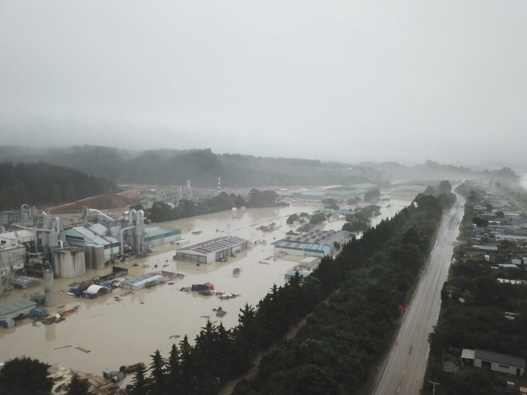Follow
the podcast on

At home, we’ve just got rid of the landline. And, just like that, we’re saving about $60 a month.
But after everything that’s been going on around the country over the last few days and weeks, I could be forgiven for thinking that the landline is the last thing we should be ditching.
Because it seems to me, after watching all the reports from up north, that our infrastructure in New Zealand is no more reliable than it was back in the days of the Canterbury earthquakes.
Power out, roads impassable, stormwater systems inundated. But, since I mentioned the landline, let’s start with phones and the internet.
There have been outages all across the North Island this week - with some people saying that, because of it, it’s been hard to get a clear picture of the impact and damage the cyclone has caused in some parts.
Which does seem incredible in modern-day New Zealand, doesn’t it? It’s the sort of thing we’re used to hearing when there’s a natural disaster in places like the Pacific Islands. But not here in New Zealand.
But, given the fact that the telecommunication companies have done their absolute best in recent years to get us off the landline and onto our mobiles, maybe we shouldn’t be so surprised.
Want to save $60 a month? You do? Easy - just get rid of your landline.
The thing is, though, I remember when the earthquakes happened how vital that landline was.
While the cellphones were pinging night and day with text messages sent hours or days earlier, we just plugged in the old phone to the copper line in the wall.
Not now though. The old phone’s still sitting in the emergency box but it won’t be much use with the landline disconnected.
And if we’re ever in a situation again like we were back in 2010 and 2011 - or even when we’re hit by the likes of the cyclone which is battering the North Island - most of us will be at the mercy of the cellphone networks.
Which, as we’re seeing this week, certainly have their weak points.
But, when it comes to New Zealand’s infrastructure, the phone and internet networks are just the start. Roads are another thing.
Even when the sun is shining, our roads are falling apart. I don’t need to tell you about the potholes that seem to be left, right and centre all over the place.
Can you imagine what the roads are going to look like once all the water goes? Our broken roads are going to continue being a topic of conversation for a long time to come.
But they are another symptom of how we, as a country, seem to have been more than happy to cut as many corners as possible over the past 10 or 20 years.
Copper landlines are really expensive to maintain. Let’s get everyone on mobiles and then we won’t need it.
Roads - they’re expensive too. Let’s spend less on them too and just keep fixing them up when they fall apart.
These are two prime examples of how we have allowed corners to be cut and how we are now being bitten on the backside.
And then there’s our electricity and stormwater networks. This is where we bring in our old friend Max Bradford. Remember him?
1997 was the year and he stood up on TV and said his de-regulation of the energy sector was going to mean one thing - cheaper electricity. I can remember him saying that as clear as day.
What a load of old nonsense that was. The other thing about his de-regulation, is that we have a complicated web of electricity generators, distributors and retailers who have to nut out where the problems are and work out who’s responsible for fixing them.
So add all that up - more and more people on cellphones and not using landlines anymore, roads that fall apart even when it’s not raining and when there are no cyclones, and a complicated electricity system which is, largely, reliant on technologies from the 1950s and 60s - then no wonder we can’t cope with the worst storm to hit New Zealand this century.
Which, might I point out, is only the last 22-and-a-bit years.
Which all tells me that our infrastructure is so not up to the job of keeping us connected and moving - in the good times and the not-so-good times.
Take your Radio, Podcasts and Music with you









